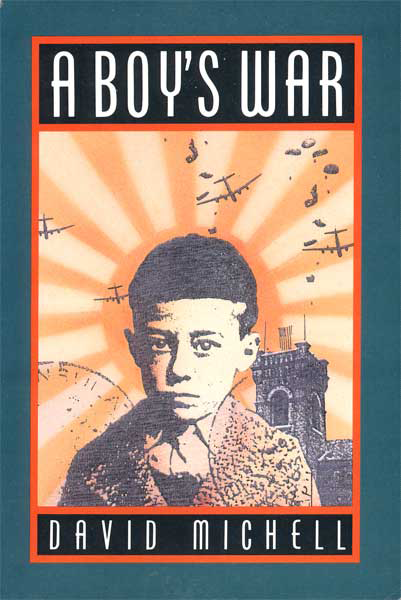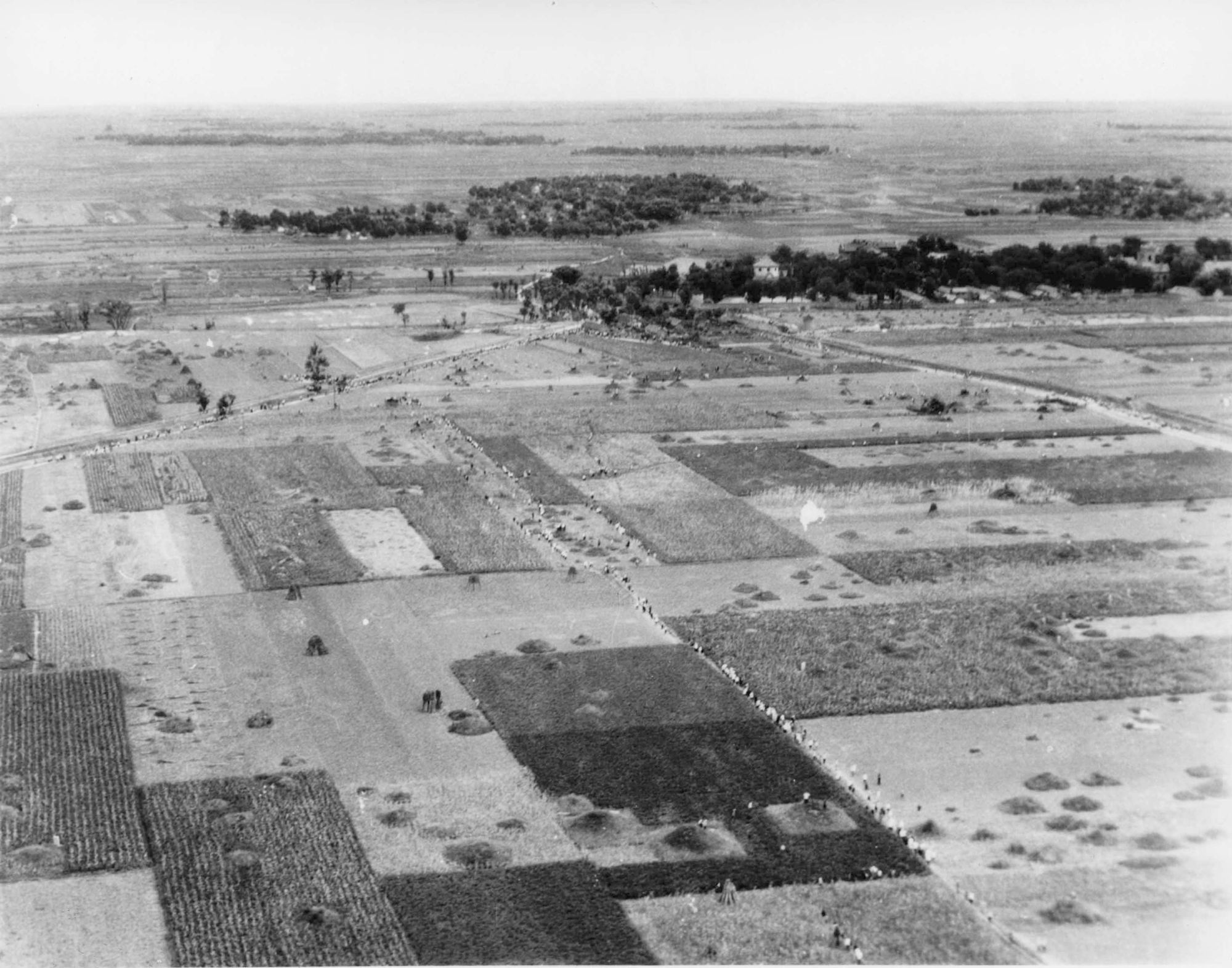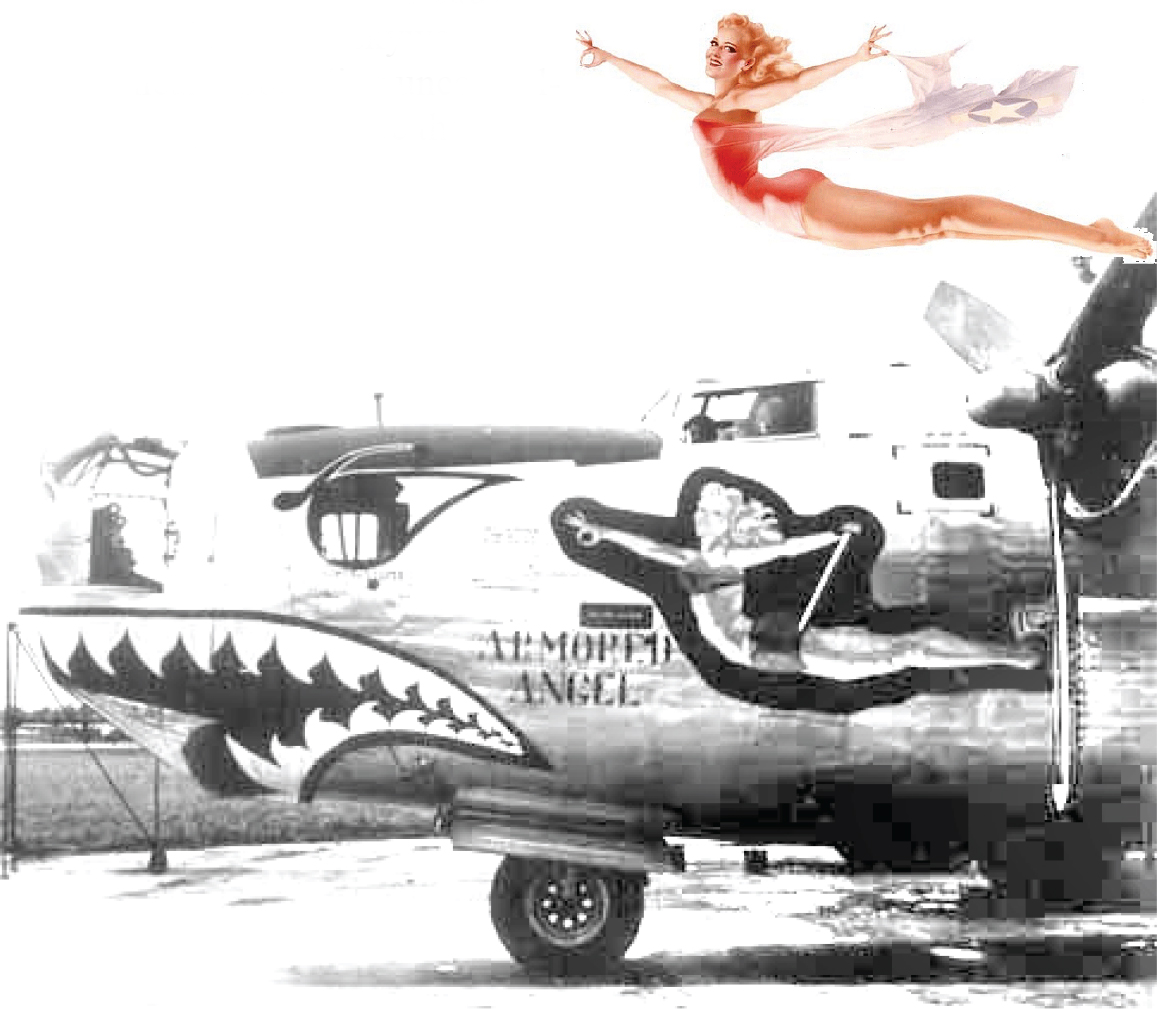
- by David Michell
[Excerpt] ...
[...]
 Back in Weihsien camp the second week of August was very busy for our coolie couriers.
Back in Weihsien camp the second week of August was very busy for our coolie couriers.
They brought in news from Tipton and Hummel that there were signs of surrender. The rumor factory in camp was never busier, but August 15, VJ Day, came and went just like any other day, with no definite news from our camp leaders or the Japanese.
Friday, August 17, started ordinarily enough. The work squads were going about their usual duties in the kitchens, at the ash heaps, or other places. When at 9:00 a.m. our class went down to the church for our weekly singing lesson, little did we know we were coming up to one of those moments whose every detail would be etched on our memories.
The mid-summer sun seemed to be beckoning us as it filtered through the ornate corner windows of the church. “Let’s try it one more time,” our singing teacher said, with a hint of resignation. I was trying hard to hit the high notes but the weekly spoonful of crushed eggshells (for calcium), coaxed down my throat by the teacher that morning, turned my efforts into a sound little better than a growl.
We were droning our best, when all at once everything was drowned out by a deafening roar right over our heads. Above the din we heard frantic shouts of “American plane! American plane! It’s heading straight for us.”
We dashed outside and were caught in a frenzied flow of able-bodied inmates pouring out of the little shacks and crowded rooms onto the athletic field. The pumps, the coal balls, the washing and even the kitchens were abandoned.
We all ran to join the swelling throng already gazing raptly skyward, hearts pounding uncontrollably. Could it be that at last our three years of captivity were about to end? The plane had turned and was coming in very low, just sweeping over the lookout towers and the walls.
Shirts and arms were waving wildly as people began to jump up and down. Hysteria was at fever pitch, with some running in panic to and fro, others frozen to the ground, their upturned faces and searching eyes magnetized as it were by the huge B-24.
As the plane came down lower, we could see people inside and then its name, “The Armored Angel.” The plane flew right over, and we expected that any moment the Japanese soldiers would open fire on it.
Then slowly, slowly the plane started upward again, moving away from the camp.
Was it going to leave us after all?
Then, to the piercing shrieks and wild cries of everyone, seven GI’s parachuted down, floating out of the sky like saviors from another world. Nothing could stop us now.
The forbidding gray walls and massive gates in an instant lost their terror. Not even the guards with their bayonets drawn as they stood in line could block our headlong stampede.
Some of us children, barefoot and dressed only in shorts, were first down the cinder road to the main gate. We hesitated only momentarily as we neared the soldiers. The shouts and cheers behind us and the hope of deliverance within reach took away our fears.
As we surged through the gates with spirits bursting for freedom from the years of imprisonment, the guards fell away to the sides.
The stronger men, who reached the Americans first, were met by drawn pistols, since the GIs were prepared to meet Japanese soldiers. Henry Lack, one of our Chefoo boys, wearing only shorts and covered with soot from head to foot from stoking, came upon one of the airmen.
Challenged the GI: “Are you British or American?”
Flustered by the pistol, young Henry apologized for his blackened appearance and said, “I’m supposed to be British!” Stowing away his pistol, the GI responded, “Boy, good to meet you; the war is over, and we’ll soon have you out of this.”
Another of the GIs was seized by one of the women, who hugged him around the neck and kissed him before fainting in his arms. Not so amorously inclined, the airman yelled to his buddies, “Hey, you guys, take this dame off my neck!”
In no time the parachutists were hoisted up by the prisoners onto the men’s shoulders above the head-height corn and tall sorghum stalks, besieged by adoring girls and wide-eyed children.

One GI’s remark was long remembered: “I wouldn’t change places with Clark Gable for all the tea in China.”
We younger children couldn’t get there fast enough to be part of the first welcome. Though the soles of our feet were hardened from the barefoot life, our camp had long since been denuded of every prickle, and now the prickles on the dirt road slowed us down. As a small group of us were limping along, eyes strained in the direction of where the parachutes had disappeared, we suddenly heard screams warning us to look out.
A bundle without a parachute had been thrown out of the plane and was hurtling towards us.
Like pillars of salt we stopped dead in our tracks. The bundle kept plunging earthward and then with a terrifying impact buried a Chinese farmer in the field and bounced over our heads, showering us with dust and stones before landing in a little muddy creek that ran through the village.
The farmer was dug out and carried into camp. After being unconscious for two weeks, he recovered and was given reparation for his injuries.
This near tragedy for us was quickly forgotten as the triumphant procession of shoulder-borne liberators approached. We tagged along, shouting and cheering as we tugged the billowing folds of parachutes along the ground, bringing up the rear.
What a triumphal procession we were!
No ticker-tape parade could ever have matched it. Main Street by now was packed with people.
Nobody could stand to miss anything. The camp band was ready for this day and had taken up their positions at the back of the church. As the procession came nearer, they struck up the medley which they had in readiness.
We had always loved to watch the band practice. Even the Japanese guards had often stood and listened. But neither they nor we had caught on to their scheme. Little did we realize that the cleverly disguised drills that we had been listening to over the past months were various national anthems without the melody!
Now loud and clear the notes rang out above the din, and Americans, British, Chinese, and others joined in singing the songs of victory.
As we neared the gates, tension grew. But nothing happened. Exuberant spirits won the day as we pressed into the camp, where pandemonium had broken loose.
The leader of the parachutists, Major Stanley Staiger, from Klamath Falls, Oregon, pushed through the crowd into the guardhouse with both pistols drawn to confront the commandant, who must have known the war was over because he and the whole garrison surrendered without resistance.
In a master stroke of face-saving, the Americans handed back the role of security of the camp to the Japanese. After all, what could seven GIs do? They hadn’t even come to take over!
Our new heroes, Major Staiger and his men, explained that they had really come only to assess the situation and make arrangements to evacuate the critically ill and the elderly.
One of the team, of whom we were particularly proud, was Navy Lieutenant Jimmy Moore, a graduate of Chefoo School. He was the son of missionaries and had volunteered to be in the first reconnoiter party because many of us were missionaries and children.
When he reached the camp, his first words were, “Take me to Mr. Bruce!”
Some years later, General Wedemeyer, who had been in charge of the rescue of foreign prisoners in China, said that in his view the rescue attempt by the seven was a “suicide mission” because of the paranoid military intentions of Japan to kill all Allied captives.

[further reading]
http://www.weihsien-paintings.org/books/aBoysWar/ABoysWar(LaTotale)-pages.pdf
#








